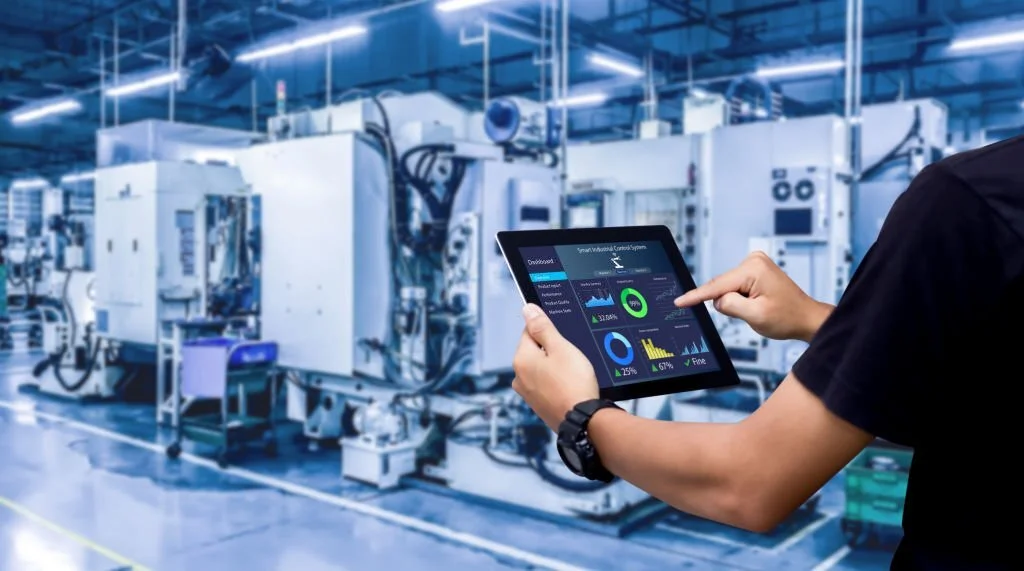Digital transformation in manufacturing is the process of applying digital technologies and automation systems across all production activities to enhance efficiency, reduce costs, optimize processes, and create new value for the business. This process goes beyond simply changing technology; it involves transforming management practices, operations, and decision-making within the enterprise. The required competencies for digital transformation differ significantly from those of traditional factories.
Digital Transformation in Manufacturing: A Comprehensive Guide
What is Digital Transformation in Manufacturing?
Digital transformation in manufacturing involves integrating digital technologies and automated systems throughout production processes. This aims to boost efficiency, cut costs, optimize workflows, and create new value for businesses. It extends beyond simply adopting new technology; it’s about fundamentally changing how a business is managed, operated, and how decisions are made.
Key Technologies Driving Digital Transformation:
-
Manufacturing Execution Systems (MES): These systems monitor, manage, and control production activities from raw materials to finished goods, providing real-time insights into machine performance, output, and product quality. This enables process optimization and minimizes production errors.
-
Enterprise Resource Planning (ERP): ERP software integrates all departments and processes within a business into a single system, covering finance, accounting, production, logistics, and human resources. This facilitates efficient resource management, reduces errors, and optimizes costs.
-
KPI and Performance Management Tools: Tracking and evaluating Key Performance Indicators (KPIs) helps assess production efficiency, improve processes, and optimize workforce performance. KPI software facilitates setting up, monitoring, and managing these indicators, enabling data-driven decision-making.
-
Automated Time Attendance Systems: Integrating automated time attendance systems ensures accurate tracking of employee working hours, reduces time theft, minimizes HR management time, and ensures fair compensation.
-
Internet of Things (IoT): IoT connects factory equipment and machinery, enabling remote monitoring of machine status, production process control, and real-time data collection for analysis.
-
Artificial Intelligence (AI): AI optimizes production by predicting and detecting errors, optimizing machine performance, and improving product quality. It also aids in Big Data analysis to generate predictions and optimize production planning.
-
Robotics in Manufacturing: Robots can perform repetitive tasks with high precision, reducing labor time and costs while enhancing accuracy and efficiency.
-
Virtual Reality (VR): VR aids in employee training, simulating production processes, and designing new products. This allows businesses to optimize design, testing, and development without significant investment in physical materials.
-
Big Data Analytics: Collecting and analyzing data from production processes provides insights into trends, enabling process optimization and more accurate decision-making.
Benefits of Digital Transformation in Manufacturing:
-
Process Optimization: Automation and intelligent systems reduce production time and labor costs while enhancing product quality.
-
Enhanced Competitiveness: Businesses can respond faster to market fluctuations and customer demands with agile and intelligent management systems.
-
Data-Driven Decision-Making: Big Data, AI, and analytical tools enable strategic decisions based on factual data rather than intuition.
-
Increased Labor Productivity: Technologies like robotics and AI automate complex tasks, reducing errors and allowing employees to focus on more creative and value-added activities.
-
Sustainable Development: Digital transformation promotes sustainable practices by optimizing resource utilization and minimizing waste, aligning with environmental responsibility.
Impact of Digital Transformation on Manufacturing Businesses:
-
Streamlined Production Processes: Automation minimizes production time and labor costs, enhances product quality, and allows for data-driven monitoring and maintenance.
-
Efficient Supply Chain Management: Real-time goods tracking through technologies like IoT reduces waste and optimizes inventory management, while data analysis improves ordering and demand forecasting.
-
Enhanced Customer Experience: Data-driven insights enable personalized services, improved products, and seamless digital communication channels for enhanced customer interaction.
-
New Product and Service Development: Data analysis on user needs facilitates the development of market-driven products, including smart, connected devices that expand market reach and product value.
-
Improved Decision-Making Capabilities: Data analytics support strategic decisions, enabling agile responses to market changes, while intelligent management tools aid performance monitoring and data-driven decision-making.
-
Increased Competitiveness: Process, product, and service improvements provide a sustainable competitive advantage, enabling businesses to adapt to market changes and evolving customer needs.
-
Organizational Culture Shift: Digital transformation fosters innovation and a culture of continuous improvement, leading to a flexible and adaptable workforce proficient in new technologies.
-
Enhanced Collaboration: Data and information sharing are streamlined, facilitating efficient communication and collaboration between departments.
Evolving Workforce Skill Requirements for Digital Manufacturing:
-
Technology and Digital Literacy: Proficiency in MES, ERP, IoT, AI, and Big Data technologies is crucial, requiring employees to operate smart devices, automation systems, and software applications effectively.
-
Data Analysis Skills: Analyzing and interpreting data generated from production processes is key to optimizing processes, predicting errors, and making informed decisions.
-
Agile and Innovative Thinking: Adapting to rapid technological advancements requires flexibility, while creativity drives process optimization and technology enhancements.
-
Automation and Robotics Management: Understanding the management and collaboration with robots and automated systems is essential, including programming, operation, monitoring, and maintenance.
-
Occupational Safety and Cybersecurity: Knowledge of cybersecurity protocols is crucial to protect connected systems from threats, while occupational safety skills are paramount in automated environments.
-
Teamwork and Communication: Effective collaboration and communication between departments are vital for information sharing, process coordination, and problem-solving, particularly in integrated systems like ERP and MES.
-
Sustainable Development Mindset: Understanding sustainable production practices, efficient resource utilization, and waste reduction is key to aligning with environmental responsibility.
-
Continuous Learning and Adaptability: The fast-paced evolution of technology necessitates continuous learning and upskilling to remain relevant and adapt to new tools and methodologies.
In conclusion, digital transformation in manufacturing requires a shift from traditional skill sets to encompass technology proficiency, data literacy, automation management, and a mindset geared towards innovation, collaboration, and sustainability. This transformation empowers businesses to enhance efficiency, competitiveness, and resilience while empowering employees to thrive in the evolving landscape of modern manufacturing.

 English
English
